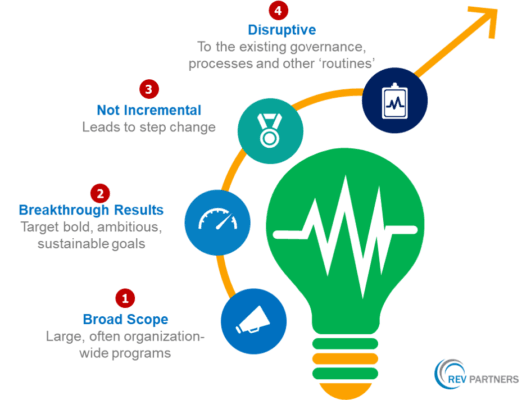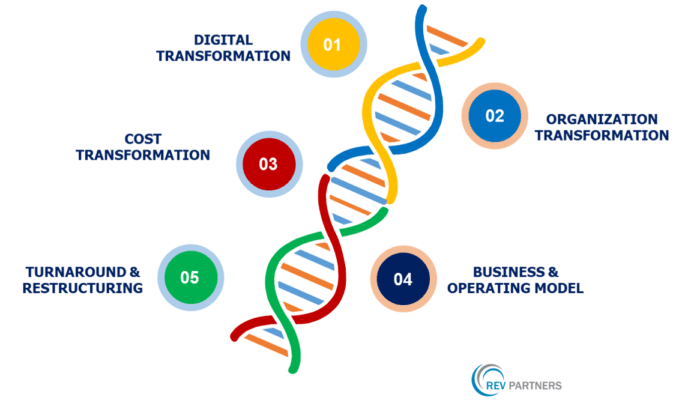What is Business Transformation?
Firms today are faced with an unprecedented degree of disruption and change. Incumbents face threats to market position from new, nimble competitors. Emerging digital business models challenge yesterday’s approaches and status-quo. Threat of margin erosion from agile, established players worry CEOs constantly. No wonder, the life expectancy of an S&P 500 company has shrunk significantly. In this article, explore what is Business Transformation.
As a result, firms increasingly resort to course correction and Business Transformation.
While there is a material acceleration of interest in the term Business Transformation, there is lack of unanimity in the understanding of what really is meant by Business Transformation.
So, what is Business Transformation?
Business Transformations are large, often company-wide change programs with the potential to change the trajectory of a company and to deliver breakthrough results. A Business transformation program therefore includes (often multi-year) initiatives designed to lead to a step-change – in operations, business model, cost position or other strategic dimensions.
Key Characteristics of Business Transformation
While the scope and scale of Business Transformations differ, in my experience, they share four key characteristics:

Exhibit 1: Four key characteristics of Business Transformations
1) Broad scope: Business Transformation refer to large, often organization-wide programs. A cost reduction at a plant is not Business Transformation.
2) Target breakthrough results: Bold ambition is a key ingredient of Business Transformations. For example, moving from the predictability of DVD rentals to a streaming-driven business model was a transformative move for Netflix and was the breakthrough that led to multiple years of growth.
3) Not Incremental: Incrementalism is the opposite of transformation. In 2007, Ørsted derived 15% of its revenues from Green energy. By 2017, the number was 85%. True Business Transformations lead to a radical change.
4) Disruptive: Business Transformation are disruptive. To the existing governance, processes and other established ways of working. Intuit has self-disrupted and reinvented itself repeatedly, including how it governs and runs its business.
Types of Business Transformation
As business cycles run their course or growth rates mature, firms find it critical to launch transformation programs to help them regain market positions or margins that might have been eroded. Robust Business Transformation programs should often, if not always, lead to a fundamentally different DNA of the company. Based on my experience, there are five key types of Business Transformations that could change the DNA of a firm. (See exhibit below)


Exhibit 2: Five Types of Business Transformations
- Digital Transformation: Using digital technology to fundamentally target new or larger revenue segments, rewire operations or increase efficiency.
- Organization Transformation: Step-change in performance through radical change in organization structure, capabilities, culture and behaviours.
- Cost Transformation: Fundamental shift in cost structure and cost competitiveness leading to long term advantages in the marketplace.
- Business Model & Operating Model: Business Model Transformation refers to disruptive ways in which a firm competes, derives revenue or targets a profit pool. Operating Model Transformation includes fundamental shifts in value chain and route-to-market.
- Turnaround & Restructuring: Business Transformation in distressed or urgent situations, and often with a strong focus on urgently turning around the financials and liquidity positions of a company.
In this era of constant disruption and change, it is possible, and highly likely, that an organization has multiple types of Business Transformations underway at the same time. After all, most firms might be pursuing Digital Transformation in one business segment while simultaneously pursuing Cost Transformation in another business segment.
——————————————————————————————
REV Partners is a Management Consulting & Advisory firm. We help Fortune 500 & Private Equity clients address the most pressing issues related to Transformation, Strategy, Operations, Organization and Digital. We can also provide experienced experts as Interim “Chief Transformation Officer” or equivalent, to accelerate, lead and execute ambitious Business Transformation or Digital Transformation programs. If you or your organization need support, please contact us or Email us at: meet@revpartners.com. © REV Partners. All Rights Reserved.

